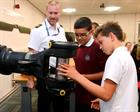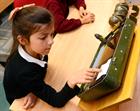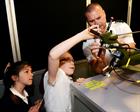SPECIALIST NAS SHOW SCHOOL CHILDREN AN EXCITING SIDE OF SCIENCE
Portsmouthschoolchildren paid a visit to 1710 Naval Air Squadron (NAS) in Portsmouth Naval Base to see for them self just how exciting a job in science and engineering can be.
1710 NAS is a centre of excellence providing specialist engineering, repair, upgrade and scientific support to Royal Navy air squadrons and military front line units on land and sea operations across the world. It is proud of its achievements and is working with schools to promote science, engineering, technology and maths (STEM) subjects.
A group of 12 children fromMeonJuniorSchool,Portsmouthgot the rare opportunity to see inside the squadron and try out some of the training facilities that air engineering technicians use in their own learning. They took part in a hands-on experiment in the lab working alongside naval engineers to control a model helicopter. Their task was to reduce vibrations on the aircraft, drawing on their engineering knowledge to correct faults that in a real life situation could destroy the helicopter or injure the people inside. They also spent time in the hangar learning about the Royal Navy Sea King helicopter that is currently at the squadron’s base to receive modifications before returning back to front line service.
Finlay Haynes, 11, said: “It has been a really fun day because we got to learn how to do real things in the lab. The best thing was getting to control the helicopter and make it work.” Classmate Jacob Mahmud, 11, said: “It was great because we got to see how the experts do it and learn a bit more than most people would.”
2
So keen are the squadron to put their knowledge and enthusiasm to good use that 24 of the squadrons 170 personnel have recently trained as STEM ambassadors and will work with schools in the community to spread the word about the opportunities which come from pursuing STEM subjects and careers.
Air Engineering Officer Lt Andy Vance, who is one of the STEM ambassadors said: “It’s great to be able to show these nine and 10 year olds what we do and how we use science, technology, engineering and maths every day providing the service we do supporting the front line. They have been very keen but have probably grown up with the idea that scientists and engineers are mad, funny guys with a white coat and crazy hair mixing potions all day but now they've come here and seen first hand what we provide and they love it.”
The majority of 1710 NAS personnel are either Royal Navy engineers or civil servants but Army Engineers from the REME and RAF are also assigned to the Squadron. The civilians are generally scientists with a broad range of skills such as material science and chemistry. Technical disciplines include stress engineering, composite expertise, vibration analysis and forensic engineering.
It was awarded the Naval Capability Trophy 2014 for its vital role in keeping servicemen and women safe in the air. During 2014 the units repair team carried out 116 repairs on 17 different types of aircraft in operational theatres ranging from the Arctic, Falkland Islands andAfghanistan; and the squadrons modifications team delivered three urgent adjustments for the Merlin Mk 2 helicopter in support of live operations. In addition they made more than 20 capability enhancements to a wide variety of Royal Navy and other aircraft.
Each year the materials and monitoring section analyses more than 40,000 oil and 3,000 fuel samples and provides technical forensic investigation services to front-line units both overseas and in theUK.







